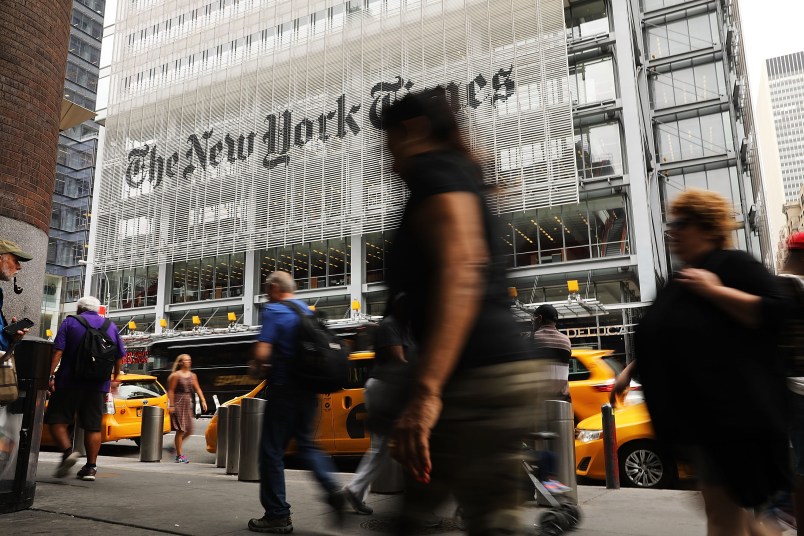President Donald Trump last week bragged about popularizing the term “fake news” and mentioned how other countries had begun to ban content judged to be fake, the New York Times reported Sunday.
The Times was reporting on its own publisher, A.G. Sulzberger, who, along with Times editorial page editor James Bennet, met with Trump on July 20.
While the conversation was initially agreed to be off the record, the Times said Trump had put broken that agreement by tweeting about the meeting on Sunday. Subsequently, Sulzberger released a statement in which he recalled warning Trump that using terms like “enemy of the people” to describe journalists would inspire violence against them.
Based on a phone call with Sulzberger, the Times White House correspondent Mark Landler reported an additional topic from last week’s meeting:
At another point, Mr. Trump expressed pride in popularizing the phrase “fake news,” and said other countries had begun banning it. Mr. Sulzberger responded that those countries were dictatorships and that they were not banning “fake news” but rather independent scrutiny of their actions.
In April, Malaysia made it a criminal act to share information deemed to be fake news — “any news, information, data and reports which are wholly or partly false, whether in the form of features, visuals or audio recordings or in any other form capable of suggesting words or ideas” per Poynter — becoming the first country to do so, according to the Times.
Since then, other countries have pursued laws to restrict news considered to be fake.
Later on Sunday, Trump appeared to respond to Sulzberger’s statement with more tweets.
When the media – driven insane by their Trump Derangement Syndrome – reveals internal deliberations of our government, it truly puts the lives of many, not just journalists, at risk! Very unpatriotic! Freedom of the press also comes with a responsibility to report the news…
— Donald J. Trump (@realDonaldTrump) July 29, 2018
…accurately. 90% of media coverage of my Administration is negative, despite the tremendously positive results we are achieving, it’s no surprise that confidence in the media is at an all time low! I will not allow our great country to be sold out by anti-Trump haters in the…
— Donald J. Trump (@realDonaldTrump) July 29, 2018
…dying newspaper industry. No matter how much they try to distract and cover it up, our country is making great progress under my leadership and I will never stop fighting for the American people! As an example, the failing New York Times…
— Donald J. Trump (@realDonaldTrump) July 29, 2018
…and the Amazon Washington Post do nothing but write bad stories even on very positive achievements – and they will never change!
— Donald J. Trump (@realDonaldTrump) July 29, 2018







The searchers all say
He’d have made Whitefish Bay
If he’d had even the slightest f*cking glimmer of a hint of a clue what he was doing
This happened last month…
https://www.huffingtonpost.com/entry/donald-trump-responds-capital-gazette-shooting_us_5b35e777e4b08c3a8f692bc3
Sorry, tons-o-fun. But you’re going down. No amount of lying, bleating, covering up, and attempts to perpetuate the false narrative that the press is the enemy of the people will save you. Your own lies are going to bury you.
(Clapping)
I tell ya man, I am dying, just dying over that.
90% of the coverage of the Trump administrations n is negative? That means the press is pretty accurate. Although, there’s still that 10%.